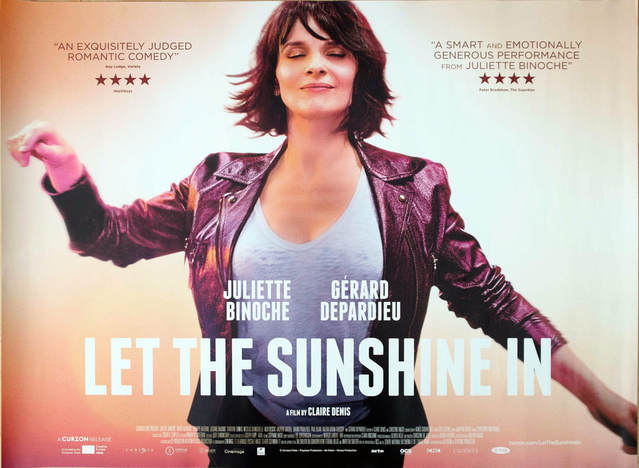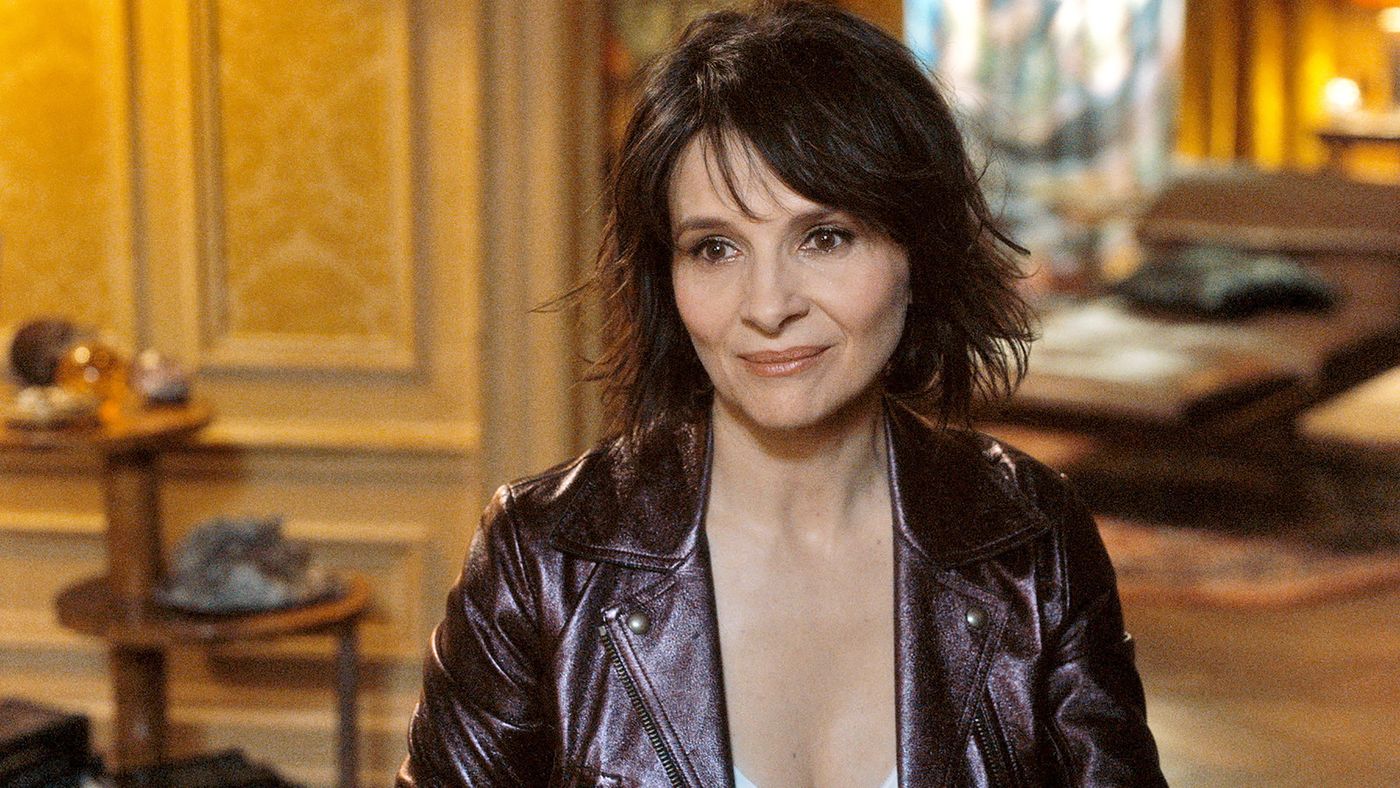
Reviewed by Mick La Salle | San Francisco Chronicle
The movie is called “Let the Sunshine In,” but don’t think about the title. It has nothing to do with this Claire Denis film, and no one ever uses those words over the course of the movie. The French title — “Un beau soleil interieur” (a beautiful inner sun) — is more in the right spirit. It’s a deep and moving investigation into one woman’s inner struggle as she goes about looking for true love.
A mix of comedy and drama, “Let the Sunshine In” has an ironic, self-knowing quality that at the same time allows for plunges into raw emotion. People act silly, but the silliness comes from needs central to human happiness. Denis has never been a sentimental filmmaker, but she has always been aware, in a clear-eyed way, of what every French filmmaker seems to know, that love is the whole ballgame. This has produced some unforgettable moments in her films, such as the beautiful sequence in “Nenette and Boni,” in which a husband watches his wife with loving awe as she goes about doing chores to the Beach Boys’ “God Only Knows.”
In “Let the Sunshine In,” Juliette Binoche becomes the ideal actress to put over Denis’ vision. She can go from laughter to tears and back again to laughter in practically the same sentence, because her emotions are so on the surface. Binoche seems to carry with her an awareness of absurdity, which keeps her from ever being maudlin. As Isabelle — a divorced woman around 50, a successful artist still hoping to find the love of her life — Binoche doesn’t take herself seriously, even as she takes her situation very seriously.
Clearly, Isabelle isn’t meeting the right men. We first find her in bed with her married lover, a sleazy banker who tells her, “I’ll answer the question you’re not asking. I’ll never leave my wife. You are charming, but my wife is extraordinary.” Xavier Beauvois — the director of great films such as “Le Petit Lieutenant” and “Of Gods and Men” — plays the banker with a self-satisfied smugness just short of comedy.
Other men follow, all of whom are a bit less ridiculous. But we come to see Isabelle as the victim of an unequal situation. As someone looking for the ultimate, she automatically has more invested in each encounter. And perhaps the men she meets can sense this, and they use this to their advantage.
If this were an American movie, “Let the Sunshine In” would really be about letting in the sunshine, about working some internal change to bring about immediate positive results. It would be all about seeing lots of wrong guys on the way to the ideal one, and maybe about recognizing the ideal one against all odds — the meeting cute, the fake arguments, the sudden, unexpected realizations, the swelling of the soundtrack. You know, the usual thing.
Don’t expect the usual thing here. “Let the Sunshine In” is its own thing. It’s about the phenomenon, the state of life, of wanting somebody. And it’s particularly about being in that situation well into midlife, as in a decade past the actual midpoint. It’s about the attendant pains and awkwardness of that state, but also the dignity of it, the desire, the belief involved, and the willingness to take risks. As such, it’s a true original and a major achievement, the clearest and most moving work from Denis in years.
As for Binoche, she brings to every moment and every encounter, whether with friends, lovers or business associates, a complete, in-the-moment freshness and yet a wealth of life experience. She gets us to a point with Isabelle that we feel that we know what she’s thinking, without her needing to say anything. It’s a role that calls for wit, spontaneity, warmth, loquaciousness, raw-edged jumpiness and deep-revolving internality, and Binoche finds all of it, and with seeming ease, as if merely living and reacting. It’s the great Binoche performance of the decade.
The movie is called “Let the Sunshine In,” but don’t think about the title. It has nothing to do with this Claire Denis film, and no one ever uses those words over the course of the movie. The French title — “Un beau soleil interieur” (a beautiful inner sun) — is more in the right spirit. It’s a deep and moving investigation into one woman’s inner struggle as she goes about looking for true love.
A mix of comedy and drama, “Let the Sunshine In” has an ironic, self-knowing quality that at the same time allows for plunges into raw emotion. People act silly, but the silliness comes from needs central to human happiness. Denis has never been a sentimental filmmaker, but she has always been aware, in a clear-eyed way, of what every French filmmaker seems to know, that love is the whole ballgame. This has produced some unforgettable moments in her films, such as the beautiful sequence in “Nenette and Boni,” in which a husband watches his wife with loving awe as she goes about doing chores to the Beach Boys’ “God Only Knows.”
In “Let the Sunshine In,” Juliette Binoche becomes the ideal actress to put over Denis’ vision. She can go from laughter to tears and back again to laughter in practically the same sentence, because her emotions are so on the surface. Binoche seems to carry with her an awareness of absurdity, which keeps her from ever being maudlin. As Isabelle — a divorced woman around 50, a successful artist still hoping to find the love of her life — Binoche doesn’t take herself seriously, even as she takes her situation very seriously.
Clearly, Isabelle isn’t meeting the right men. We first find her in bed with her married lover, a sleazy banker who tells her, “I’ll answer the question you’re not asking. I’ll never leave my wife. You are charming, but my wife is extraordinary.” Xavier Beauvois — the director of great films such as “Le Petit Lieutenant” and “Of Gods and Men” — plays the banker with a self-satisfied smugness just short of comedy.
Other men follow, all of whom are a bit less ridiculous. But we come to see Isabelle as the victim of an unequal situation. As someone looking for the ultimate, she automatically has more invested in each encounter. And perhaps the men she meets can sense this, and they use this to their advantage.
If this were an American movie, “Let the Sunshine In” would really be about letting in the sunshine, about working some internal change to bring about immediate positive results. It would be all about seeing lots of wrong guys on the way to the ideal one, and maybe about recognizing the ideal one against all odds — the meeting cute, the fake arguments, the sudden, unexpected realizations, the swelling of the soundtrack. You know, the usual thing.
Don’t expect the usual thing here. “Let the Sunshine In” is its own thing. It’s about the phenomenon, the state of life, of wanting somebody. And it’s particularly about being in that situation well into midlife, as in a decade past the actual midpoint. It’s about the attendant pains and awkwardness of that state, but also the dignity of it, the desire, the belief involved, and the willingness to take risks. As such, it’s a true original and a major achievement, the clearest and most moving work from Denis in years.
As for Binoche, she brings to every moment and every encounter, whether with friends, lovers or business associates, a complete, in-the-moment freshness and yet a wealth of life experience. She gets us to a point with Isabelle that we feel that we know what she’s thinking, without her needing to say anything. It’s a role that calls for wit, spontaneity, warmth, loquaciousness, raw-edged jumpiness and deep-revolving internality, and Binoche finds all of it, and with seeming ease, as if merely living and reacting. It’s the great Binoche performance of the decade.
DISCUSSION FOLLOWS EVERY FILM!
$6.00 Members / $10.00 Non-Members
TIVOLI THEATRE
5021 Highland Avenue I Downers Grove, IL
630-968-0219 I www.classiccinemas.com
We apologize—Movie Pass cannot be used for AHFS programs.
$6.00 Members / $10.00 Non-Members
TIVOLI THEATRE
5021 Highland Avenue I Downers Grove, IL
630-968-0219 I www.classiccinemas.com
We apologize—Movie Pass cannot be used for AHFS programs.







